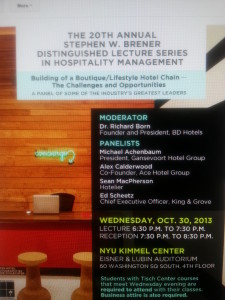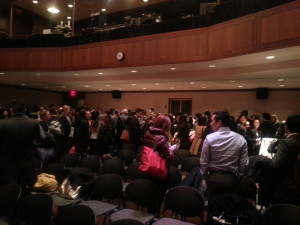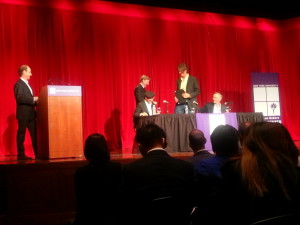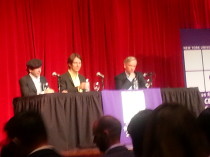I was fortunate enough to attend the New York University's 20
th annual Stephen W. Brener Distinguished Lecture Series in Hospitality Management. The topics to be discussed by our panelists were “Building of a Boutique/Lifestyle Hotel Chain and the challenges and opportunities.” Our panelists were Alex Calderwood who is the founder of Ace Hotel Group, Sean MacPherson who is a New York based hotelier and restaurateur, Ed Scheetz who is the Chief Executive Officer of King & Grove.

Boutique hotels were defined as any hotel that’s not a chained hotel. There’s no real definition and the name no longer has any real meaning.
Topics discussed: Brand vs. Non Brand Hotels
Challenges of opening a business domestic and abroad
When a company is a brand its easier for investors and developers to conceptualize your vision of a new hotel
When it’s a non-brand its difficult to get people to understand and conceptualize your vision
When opening a hotel domestically or abroad it’s important to capture the culture of the location of your hotel.
Quote of the night by Sean Macpherson “Wherever I go, I want to believe I’m in that place.” That quote to me embodies the difference between brands and non-brands. A brand is the same, follows the same model, the Hilton, Marriott, Sheraton, are the same wherever you go. When people stay at one of those brands, they know what to expect because the experience is the same everywhere. For non-brands, they have to integrate themselves with the culture of the destination. When you stay at a non-brand, you have to believe you are part of the culture of your destination. For example, if you are staying in a non-brand hotel in New York City, the unique style of the non-brand has to make you feel that you are part of the hustle and bustle of the big city.
Hiring the right people
Alex Calderwood attributed his success of his hotels to the people that he hires. They embody his vision and the organization works well within themselves. He gave the example of opening a hotel in London where he hired a manager with less experience but shared the passion and vision he was looking for. This manager is doing a great job of making the hotel successful. Even though the operations are oversees, Alex is comfortable with the way its being managed. He went out to say that the people he hires might have a difference on objectives to execute but the objectives are all great ideas that fall within his vision. He gave another example of going to a place that is well built to the gold standard but the people who work there make it unpleasant, but then you go to a place that is not gold standard but the people are amazing and the employees working there make it a great experience. This example drives home his point of hiring the right people.
What I learned
What I learned or took away from our three panelists is that each of them are driven and are highly successful. Each panelist had their own unique style that they try to input into their hotels. I learned on a high level of thinking the difference between a brand and non-brand from people who are pioneers in the industry of hospitality. The panelists showed that they had a real passion for what they do which contributes to their success. They know the current and future trends of the industry hospitality industry and they use that to continue to create businesses based on those trends.


 Boutique hotels were defined as any hotel that’s not a chained hotel. There’s no real definition and the name no longer has any real meaning.
Topics discussed: Brand vs. Non Brand Hotels
Challenges of opening a business domestic and abroad
When a company is a brand its easier for investors and developers to conceptualize your vision of a new hotel
When it’s a non-brand its difficult to get people to understand and conceptualize your vision
When opening a hotel domestically or abroad it’s important to capture the culture of the location of your hotel.
Quote of the night by Sean Macpherson “Wherever I go, I want to believe I’m in that place.” That quote to me embodies the difference between brands and non-brands. A brand is the same, follows the same model, the Hilton, Marriott, Sheraton, are the same wherever you go. When people stay at one of those brands, they know what to expect because the experience is the same everywhere. For non-brands, they have to integrate themselves with the culture of the destination. When you stay at a non-brand, you have to believe you are part of the culture of your destination. For example, if you are staying in a non-brand hotel in New York City, the unique style of the non-brand has to make you feel that you are part of the hustle and bustle of the big city.
Hiring the right people
Alex Calderwood attributed his success of his hotels to the people that he hires. They embody his vision and the organization works well within themselves. He gave the example of opening a hotel in London where he hired a manager with less experience but shared the passion and vision he was looking for. This manager is doing a great job of making the hotel successful. Even though the operations are oversees, Alex is comfortable with the way its being managed. He went out to say that the people he hires might have a difference on objectives to execute but the objectives are all great ideas that fall within his vision. He gave another example of going to a place that is well built to the gold standard but the people who work there make it unpleasant, but then you go to a place that is not gold standard but the people are amazing and the employees working there make it a great experience. This example drives home his point of hiring the right people.
What I learned
What I learned or took away from our three panelists is that each of them are driven and are highly successful. Each panelist had their own unique style that they try to input into their hotels. I learned on a high level of thinking the difference between a brand and non-brand from people who are pioneers in the industry of hospitality. The panelists showed that they had a real passion for what they do which contributes to their success. They know the current and future trends of the industry hospitality industry and they use that to continue to create businesses based on those trends.
Boutique hotels were defined as any hotel that’s not a chained hotel. There’s no real definition and the name no longer has any real meaning.
Topics discussed: Brand vs. Non Brand Hotels
Challenges of opening a business domestic and abroad
When a company is a brand its easier for investors and developers to conceptualize your vision of a new hotel
When it’s a non-brand its difficult to get people to understand and conceptualize your vision
When opening a hotel domestically or abroad it’s important to capture the culture of the location of your hotel.
Quote of the night by Sean Macpherson “Wherever I go, I want to believe I’m in that place.” That quote to me embodies the difference between brands and non-brands. A brand is the same, follows the same model, the Hilton, Marriott, Sheraton, are the same wherever you go. When people stay at one of those brands, they know what to expect because the experience is the same everywhere. For non-brands, they have to integrate themselves with the culture of the destination. When you stay at a non-brand, you have to believe you are part of the culture of your destination. For example, if you are staying in a non-brand hotel in New York City, the unique style of the non-brand has to make you feel that you are part of the hustle and bustle of the big city.
Hiring the right people
Alex Calderwood attributed his success of his hotels to the people that he hires. They embody his vision and the organization works well within themselves. He gave the example of opening a hotel in London where he hired a manager with less experience but shared the passion and vision he was looking for. This manager is doing a great job of making the hotel successful. Even though the operations are oversees, Alex is comfortable with the way its being managed. He went out to say that the people he hires might have a difference on objectives to execute but the objectives are all great ideas that fall within his vision. He gave another example of going to a place that is well built to the gold standard but the people who work there make it unpleasant, but then you go to a place that is not gold standard but the people are amazing and the employees working there make it a great experience. This example drives home his point of hiring the right people.
What I learned
What I learned or took away from our three panelists is that each of them are driven and are highly successful. Each panelist had their own unique style that they try to input into their hotels. I learned on a high level of thinking the difference between a brand and non-brand from people who are pioneers in the industry of hospitality. The panelists showed that they had a real passion for what they do which contributes to their success. They know the current and future trends of the industry hospitality industry and they use that to continue to create businesses based on those trends.



